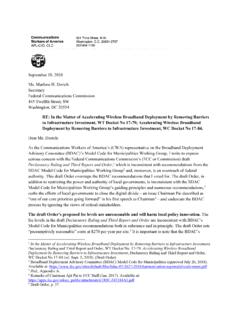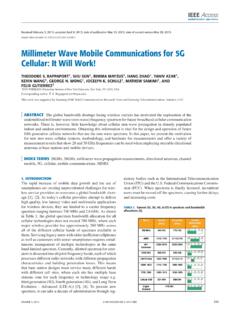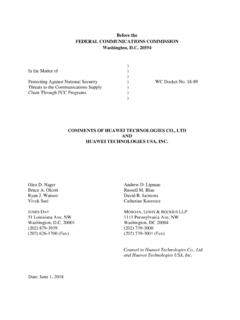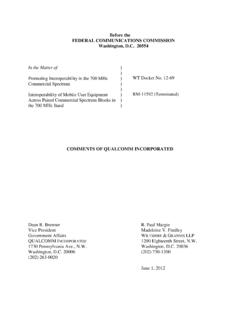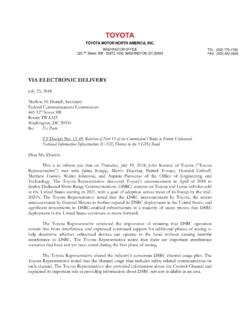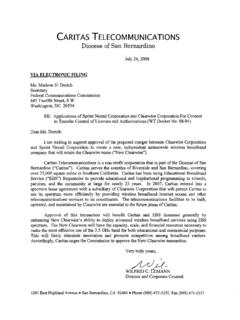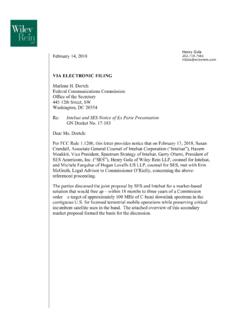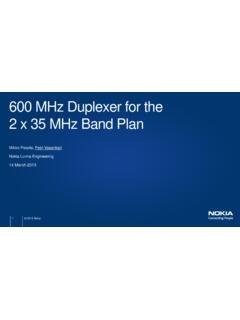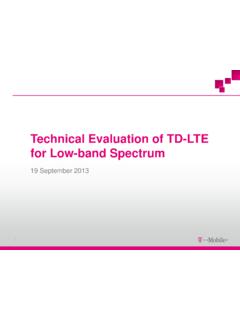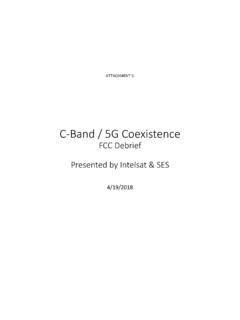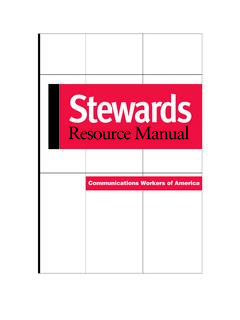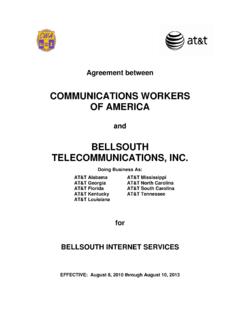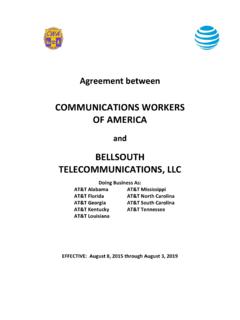Transcription of Comments of Communications Workers of America
1 Before the FEDERAL Communications COMMISSION Washington, 20554 In the Matter of ) ) Applications of T-Mobile US, Inc., ) ) WT Docket No. 18-197 and ) ) Sprint Corporation ) ) For Consent to Transfer Control of the Licenses ) and Authorizations ) Comments of Communications Workers of America Debbie Goldman Allen P. Grunes 501 Third St., Maurice E. Stucke Washington, 20001 The Konkurrenz Group (202) 434-1194 (phone) 5335 Wisconsin Ave., (202) 434-1201 (fax) Suite 440 Washington, 20015 (202) 644-9760 (phone) (202) 888-7522 (fax) August 27, 2018 EXECUTIVE SUMMARY The Commission should not approve the proposed merger between T-Mobile and Sprint as currently structured because it would result in substantial public interest harm and offers no countervailing verifiable, merger-related public interest benefits.
2 First, the merger would result in the loss of more than 28,000 jobs across the United States and combine two companies with a long history of labor and employment law violations. Contrary to the Applicants unsubstantiated claims of merger-related job creation, leading Wall Street analysts predict that massive job cuts from the elimination of duplicative retail stores and headquarters functions at the New T-Mobile will contribute significantly to the billions of dollars in projected merger synergies. Consistent with analysts predictions, CWA performed a comprehensive analysis based on detailed location data for all the retail locations involved in the proposed transaction. Our analysis finds that the proposed T-Mobile/Sprint merger will result in the loss of more than 28,000 jobs. Approximately 24,000 jobs would be eliminated as a result of overlapping retail store closures at postpaid and prepaid ( Boost and MetroPCS) locations.
3 Another approximately 4,500 jobs would be eliminated due to duplicative functions at corporate headquarters in Overland Park, KS and Bellevue, WA. The proposed merger would combine two companies with a long history of violation of employment law and Workers rights. This history speaks volumes about the trustworthiness and corporate character of these companies. T-Mobile has won the dubious distinction as being one of the worst labor law violators in the country. T-Mobile has been found in violation of labor law six times since 2015 and has been subject to approximately 40 unfair labor practice charges since 2011. Findings of illegal activity include, among other things, T-Mobile surveilling its employees and requiring employees, including one who filed a sexual harassment ii complaint, to sign an unlawful confidentiality notice prohibiting employees from discussing with one another information from employer-led investigations, and threatening discipline, up to and including discharge, if they engaged in those discussions.
4 The Commission should not approve the merger without verifiable and enforceable commitments by the Applicants to ensure that the transaction does not cause a reduction in employment, that no employees of T-Mobile or Sprint will lose a job as a result of this transaction, that the Applicants will return all overseas customer call center jobs to the , and that the Applicants commit to abide by all labor and employment laws and to maintain neutrality in allowing their employees to form a union of their own choosing, free from any interference by the employer. Second, the proposed horizontal merger of T-Mobile and Sprint raises serious competitive concerns. The proposed transaction would eliminate the substantial head-to-head competition that currently exists between T-Mobile and Sprint. T-Mobile and Sprint have a long history of targeting each other s customers. Both firms have an equally long history of responding to each other s competitive moves.
5 Because of how closely T-Mobile and Sprint compete for subscribers through their respective product and service offerings, the products and services of these two companies are likely to be close substitutes for a large number of consumers. A merger between firms selling differentiated products may diminish competition by enabling the merged firm to profit by unilaterally raising the price of one or both products above the pre-merger level. The transaction would significantly increase concentration in the national and numerous local geographic markets for mobile telephony/broadband services and prepaid wireless retail iii services, measured using both the standard market concentration screen and the Commission s standard screen for spectrum concentration. We estimated national HHIs for mobile telephony/broadband services by looking at the number of wireless connections reported as of the second quarter of 2018, as well as by revenue for wireless services in 2017.
6 We estimated national HHIs for prepaid wireless retail services by looking at the number of prepaid wireless subscribers reported by the major facilities-based providers as of the second quarter of 2018. These results show that both the mobile telephony/broadband services market and the prepaid wireless services market are highly concentrated under the Department of Justice and Federal Trade Commission s 2010 Horizontal Merger Guidelines and the change in concentration resulting from the merger is large enough to trigger the Guidelines presumption that the merger is likely to enhance market power. The results are below. Pre-Merger HHI Post-Merger HHI Change 2Q18 Wireless Connections 2,762 3,281 519 2017 Wireless Service Revenues 2,811 3,243 432 2Q18 Prepaid Wireless Subscribers 3,037 4,461 1,424 The Commission has long recognized that spectrum is an important input for wireless service and conducts an initial spectrum screen to determine if a proposed transaction raises competitive concerns regarding this key input.
7 The screen is triggered when a wireless provider would hold approximately one-third or more of the suitable and available spectrum. The New T-Mobile would exceed the spectrum screen in almost two thirds of the counties in the United iv States, with a full 92 percent of the population of the United States living in counties in which the spectrum screen would be exceeded post-merger. Third, the Applicants have not come close, by any stretch of the imagination, to providing the kind of evidence that is sufficiently rigorous and well documented to satisfy the Commission s high evidentiary standard to prove verifiable public interest benefits that will result from the merger. As an initial matter, the Applicants fail to prove their assertion that neither Sprint nor T-Mobile can effectively compete as standalone firms, and specifically that neither can win the race to deploy a next-generation nationwide 5G network.
8 Upon closer inspection, this rationale falls apart for two key reasons: Both companies are viable on a standalone basis and are already in the process of improving their networks, including their ability to provide initial 5G services. Neither company needs the proposed transaction to be an effective competitor in the future. While Sprint presently appears to lack the tools to offer 5G in rural parts of the country, the Applicants have made no showing that the merged firm would have either the incentive or ability to provide hallmark 5G services outside of densely-populated areas. The proposed merger does not change that reality for rural America . Fourth, the merger raises serious national security concerns regarding possible integration of Chinese government-owned Huawei and ZTE equipment in the Sprint and T-Mobile networks. The proposed transaction involves two companies that have a history of vendor relationships with Huawei and ZTE.
9 Both Sprint and its majority owner SoftBank have used Huawei equipment in their networks. Sprint and Boost Mobile continue to sell ZTE devices and Sprint executives have publicly praised them. In 2012, Sprint s then-majority-owned subsidiary Clearwire contracted with Huawei for network equipment. That same year, the CFIUS review of the Japanese-owned SoftBank purchase of Sprint and 100 percent of Clearwire resulted in a National Security Agreement requiring Sprint and Clearwire to remove Huawei v equipment from their networks. However, three years later, Sprint admitted that it still had Huawei equipment on the Clearwire network. The Commission should also consider the history of collaboration between Sprint s Japanese owner, SoftBank, and Huawei and ZTE. Since 2015, SoftBank has partnered with the two companies to develop and deploy 5G wireless technologies in Japan.
10 Therefore, it is imperative that the Commission weigh the Applicants claims that the proposed transaction will accelerate 5G efforts ahead of China against Softbank s and Sprint s ties to Chinese telecommunications firms. The Commission should not move forward in its review of the instant transaction until after CFIUS has ensured that Sprint fully complied with the 2013 Softbank/Sprint/Clearwire merger NSA agreement, the Applicants make binding commitments to terminate any existing relationships with vendors that pose potential security threats, and remove all equipment from these vendors from their operations. Furthermore, the Commission should require the Applicants to participate in regular national security audits to ensure compliance with Commission standards in addition to any national security agreement required by CFIUS. Such measures are particularly warranted in light of the Applicants questionable record of complying with previous national security agreements.
